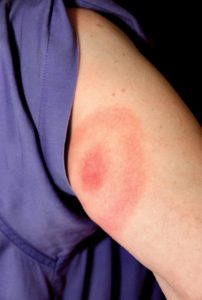Tickborne Disease
 In recent years, New Hampshire has had some of the highest incidences of Lyme disease in the United States. Lyme disease is caused by a bacteria carried by the Blacklegged tick. When a tick bites and embeds its head into a person or animal’s skin, it can transmit bacteria. Other ticks, like Dog ticks and Lone Star ticks, carry other types of diseases too; some of which can be fatal—however, to date, local transmission of these diseases has not occurred in NH.
In recent years, New Hampshire has had some of the highest incidences of Lyme disease in the United States. Lyme disease is caused by a bacteria carried by the Blacklegged tick. When a tick bites and embeds its head into a person or animal’s skin, it can transmit bacteria. Other ticks, like Dog ticks and Lone Star ticks, carry other types of diseases too; some of which can be fatal—however, to date, local transmission of these diseases has not occurred in NH.
At the New Hampshire (NH) Division of Public Health Services, the Bureau of Infectious Disease Control Sections work together to protect the health of New Hampshire residents by investigating and tracking reports of diseases that threaten the health of the public.
The Blacklegged tick can transmit Lyme disease. Other tickborne diseases that it can be transmitted and have been known to transmit in New Hampshire are: anaplasmosis, babesiosis, Powassan virus, and borrelia miyamotoi.
For more information on Lyme and other tickborne diseases, visit the New Hampshire Division of Public Health and the Centers for Disease Control and Prevention.
Several local universities and commercial laboratories can test tick samples for the bacteria that cause Lyme disease and for other pathogens.
